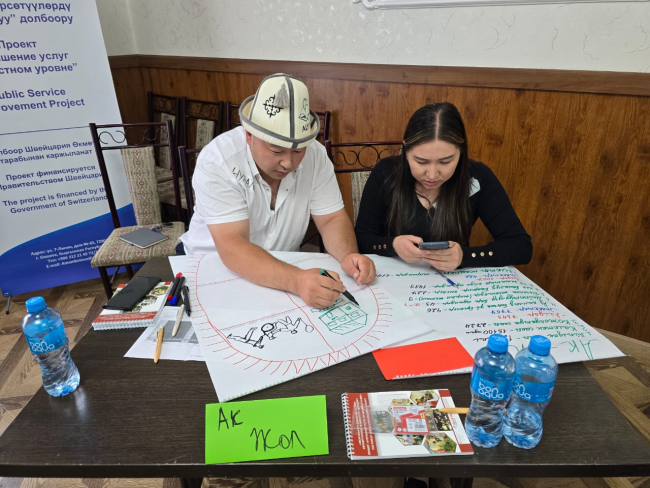- Main page ·
- Press room ·
- News archive ·
- Workshops Held on Developing Inclusive Measures in Municipal SEDPs Across Six Target Districts of...
Workshops Held on Developing Inclusive Measures in Municipal SEDPs Across Six Target Districts of the PSI Project

In May 2025, workshops were held in six target districts of the PSI Project to promote the integration of social and gender inclusion principles into local Social and Economic Development Programs (SEDPs).
These workshops provided participants with an opportunity to strengthen their strategic thinking skills through a deep dive using the “Dream” tool – envisioning the future of ayil okmotu (local self-government) through the lens of inclusive development that reflects gender and social equity across the six target districts of the project.
Participants – including deputy heads and executive secretaries of ayil okmotu, specialists in social affairs, land issues, municipal property and investment, social workers, local council members, accountants, and procurement officers – discussed how actively local governments engage people with disabilities, children with special needs, women and men, girls and boys in community life. They also analyzed the current state of inclusion in their communities, identified opportunities for improvement, and explored potential barriers to creating safe and inclusive ayil okmotu.
During the training, participants emphasized the importance of understanding inclusive development based on gender and social equity principles and forming a clear vision of the need to involve all groups of people living within the target communities.
As a follow-up, interested participants are expected to prepare proposals to take part in a competition among pilot municipalities from Jalal-Abad, Issyk-Kul, Chui, and Talas regions, highlighting the most effective incorporation of social and gender inclusion principles into local SEDPs.
The PSI Project team will review submitted proposals and award prizes to the best submissions as part of the project’s incentive fund - thus supporting the implementation of inclusive development measures at the local level.
For reference, the target districts of the PSI Project include:
- Chui District, Chui Region
- Nooken District, Jalal-Abad Region
- Aksy District, Jalal-Abad Region
- Bakai-Ata District, Talas Region
- Ak-Suu District, Issyk-Kul Region
- Jeti-Oguz District, Issyk-Kul Region
The Public Service Improvement Project is funded by the Government of Switzerland and implemented by HELVETAS and the Development Policy Institute.

